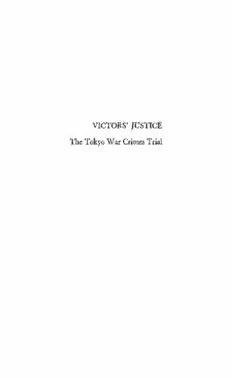
Victors' Justice: Tokyo War Crimes Trial (Princeton Legacy Library) PDF
Preview Victors' Justice: Tokyo War Crimes Trial (Princeton Legacy Library)
VICTORS' JUSTICE The Tokyo War Crimes Trial VICTORS' JUSTICE The Tokyo War Crimes Trial RICHARD H. MINEAR PRINCETON UNIVERSITY PRESS PRINCETON, NEW JERSEY Copyright © 1971 by Princeton University Press ALL RIGHTS RESERVED ISBN: 0-691-05645-5 LCC: 74-163211 Second Printing, 1972 Grateful acknowledgment is made for permission to quote from Aggression and World Order, by Julius Stone, originally published by the University of California Press, 1958, reprinted by permission of The Regents of the University of California; and from The Axis Alliance and Japanese-American Relations, 1941, copyright 1958 by the American Historical Association, used by permission of Cornell University Press. All photographs except those of Justice Pal and the defendants (pages 3 and 8 of illustrations; World War II, War Crimes Rec ords, National Archives) are U.S. Army photographs and used by permission of the Department of the Army. This book was composed in Linotype Granjon Printed in the United States of America by Princeton University Press, Princeton, New Jersey Dedicated to the many Americans whose opposition to the war in Indochina has made them exiles, criminals, or aliens in their own land. TABLE OF CONTENTS Preface ix I. Introduction 3 War crimes trials after World War II; motives lofty and low. II. The Tokyo Trial 20 Charter; indictment; judgment. III. Problems of International Law 34 Conspiracy; the responsibility of individuals before international law; aggressive war; aggression de fined; retroactivity {ex post facto character); nega tive criminality. IV. Problems of Legal Process 74 The selection of the justices; their rules of operation; the selection of the accused; the rules of evidence. V. Problems of History 125 The overall conspiracy; relations between Japan and the Soviet Union; the Axis Alliance; Pearl Harbor. VI. After the Trial 160 The Tokyo trial and Gen. Mac Arthur; the Tokyo trial and the U.S. Supreme Court; the prisoners; the Tokyo trial today. Appendices 183 Bibliographical Note 213 Index 217 PREFACE FEW Americans know much about the Tokyo trial. Most people have only a vague memory that a trial took place and that its verdict corroborated our convictions about the dastardly and criminal nature of Japan's war time leadership and policies. My major concern in writing this book has been to challenge this prevailing image of the trial, to demolish the credibility of the Tokyo trial and its verdict. Of necessity my task has been primarily a negative one, but I hope it is not without its positive as pects. There is great value to be gained from understand ing past mistakes, especially, perhaps, our own. I write primarily for an American audience, but this book will also be read in Japan, and many of my Japanese friends will be unhappy with it. For ideological or per sonal reasons Japanese scholars have stayed away from the trial. Where some coverage was unavoidable, they have tended to affirm the validity of the trial and its verdict. Apparently, they fear that denigration of the trial will lead to a positive reevaluation of Japan's wartime policies and leadership. The relation between denigration of the Tokyo trial and resuscitation of Japan's wartime policies and leader ship is not a necessary one, but the potential for mischief is obvious. For this reason I should like here to remove any doubt among my readers—Japanese or American— about my own purposes. Paraphrasing the statement of James B. Scott, legal advisor to the American delegation at Versailles in 1919: "I do not hold a brief for Tojo. I do hold a brief for justice, even to my enemies." The Tokyo tribunal found Tojo guilty and sentenced ix PREFACE him to death by hanging. It is my contention that he was legally innocent. But my brief for Tojo stops there. The Tokyo tribunal dismissed the claim that the Japanese gov ernment had been motivated by considerations of self- defense. It is my contention that considerations of self- defense played an important role. But my brief for Japan's prewar policies stops there. Many Japanese acts on the con tinent of Asia before and during the war are as repugnant to me as current American acts in Indochina. Despite my attack on the trial, I have not sought for or found scapegoats. Robert H. Jackson, Joseph B. Keenan, President William Webb, General Douglas MacArthur: all of these men I have criticized sharply, but I have not made scapegoats of them. The major share of the blame for the Tokyo trial lies with the assumptions, the world- view, all these men held in common. As my final sentence states, in punishing the Japanese leaders we fooled our selves. It is this delusion I attack, and I hope I have done so without creating new delusions. John W. Hall has written recently: "We need to rethink the causes of the Pacific war from what can only be described as a tragic view, one which takes no comfort in scapegoats and of fers no sanctuary for private or national claims of moral righteousness. . . ." Professor Hall's comment I endorse entirely. The current American concern with American war crimes in Indochina presents a second point at which misunderstanding may arise. I am fully in favor of con ventional war crimes trials, as in the case of Lieutenant Calley. Such trials are essential to American honor and to the discipline and pride of American armed forces. More over, as Brigadier General Telford Taylor and others have χ
